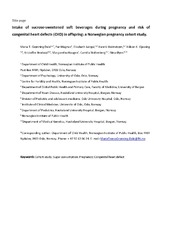Intake of sucrose‑sweetened soft beverages during pregnancy and risk of congenital heart defects (CHD) in ofspring: a Norwegian pregnancy cohort study
Grønning Dale, Maria Teresa; Magnus, Per; Leirgul, Elisabeth; Holmstrøm, Henrik; Gjessing, Håkon K.; Brodwall, Kristoffer; Haugen, Margaretha; Stoltenberg, Camilla; Øyen, Nina
Peer reviewed, Journal article
Accepted version
Permanent lenke
https://hdl.handle.net/1956/23693Utgivelsesdato
2019Metadata
Vis full innførselSamlinger
Originalversjon
https://doi.org/10.1007/s10654-019-00480-ySammendrag
Studies report increased risk of congenital heart defects (CHD) in the offspring of mothers with diabetes, where high blood glucose levels might confer the risk. We explored the association between intake of sucrose-sweetened soft beverages during pregnancy and risk of CHD. Prospective cohort data with 88,514 pregnant women participating in the Norwegian Mother and Child Cohort Study was linked with information on infant CHD diagnoses from national health registers and the Cardiovascular Diseases in Norway Project. Risk ratios were estimated by fitting generalized linear models and generalized additive models. The prevalence of children with CHD was 12/1000 in this cohort (1049/88,514). Among these, 201 had severe and 848 had non-severe CHD (patent ductus arteriosus; valvular pulmonary stenosis; ventricular septal defect; atrial septal defect). Only non-severe CHD was associated with sucrose-sweetened soft beverages. The adjusted risk ratios (aRR) for non-severe CHD was 1.30 (95% CI 1.07–1.58) for women who consumed 25–70 ml/day and 1.27 (95% CI 1.06–1.52) for women who consumed ≥ 70 ml/day when compared to those drinking ≤ 25 ml/day. Dose–response analyses revealed an association between the risk of non-severe CHD and the increasing exposure to sucrose-sweetened soft beverages, especially for septal defects with aRR = 1.26 (95% CI 1.07–1.47) per tenfold increase in daily intake dose. The findings persisted after adjustment for maternal diabetes or after excluding mothers with diabetes (n = 19). Fruit juices, cordial beverages and artificial sweeteners showed no associations with CHD. The findings suggest that sucrose-sweetened soft beverages may affect the CHD risk in offspring.
